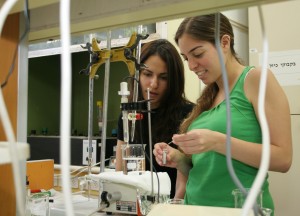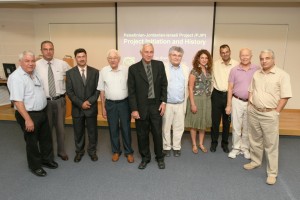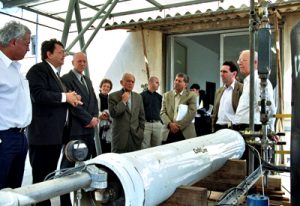Welcome to The Stephen and Nancy Grand Water Research Institute at the Technion
The mission of the Stephen and Nancy Grand Water Research Institute (GWRI) is to promote and support research and management of Israel’s water resources, maintaining the Technion’s leading position and Israel’s world leadership in this area. Given its international and regional preeminence in science, engineering, and technology, the Technion relies on the GWRI’s leadership to continue the excellence of research that solves water-related problems. The GWRI is committed to resolving the country’s scientific, engineering, and managerial water challenges. At the same time, it targets cutting-edge research in various water-related scientific disciplines. To fulfill these goals, the GWRI aims to promote the most promising research projects addressing current and future water problems and to create and pursue knowledge that will then be applied for the benefit of all. The GWRI emphasizes advancing water science, engineering, and management tools worldwide in Israel, the Middle East, and other water-stressed regions. The GWRI focuses on innovative approaches, technologies, and methods aimed at finding sustainable new ways to overcome water shortage and preserve the quality of water resources at the lowest possible cost while saving energy and considering environmental and ecological impacts. Since its establishment in 1993, the interdisciplinary nature of the GWRI has been expressed through the participation of researchers from various disciplines and institutions. There are 53 GWRI members of them 47 professors from nine Technion faculties and 6 professors/researchers from other Israeli universities and research organizations.
Main Research Areas
Water Treatment, Desalination, and Treatment of wastewater
- Water treatment (physico-chemical, biological);
- Advanced desalination technologies;
- Membranes: design-synthesis-modifications-testing- modeling;
- Energy saving and environmental aspects;
- Wastewater treatment: biological, chemo-physical, membranes, SAT;
- Nanofiers/Nanotubes/Nanochannels (concentration-polarization);
- Post-treatment of desalinized sea water;
- Treatment of industrial wastewater;
- Grey-water recycling and management aspects.
Preservation of water resources, Hydrology – source quantity and quality, Wastewater reuse & efficient irrigation
- Hydro-geophysics;
- Hydrological processes, including climate change effects;
- Monitoring & Modeling at various scales;
- Forecasting scenarios;
- Fluid-dynamics of complex water systems;
- Development of advanced analytical and monitoring tools;
- Investigation of nutrients, salinity and pollutants fate in water affected systems;
- Reuse of reclaimed wastewater for sustainable crop production;
- Water use efficiency.
Water and environmental microbiology
- Applied Genomics and Water Microbiology;
- Pathogen survival in water systems and in plants irrigated with reclaimed wastewater;
- Tracing microbial processes in water and wastewater treatment systems;
- Advanced methods for bacterial detection;
- Microfluidics-for advanced bio-sensing.
Management of urban water systems, Water resources management and policy Water resources systems analysis
- Management of Water distribution systems;
- Utilization of evolutionary single and multi-objective optimization models;
- Security and reliability aspects;
- Stochastic/deterministic systems;
- Water resources under uncertainty and risk;
- Water sensitive planning;
- Enviromatics- utilization of distributed multi-modal (physical, chemical and biological) sensor networks for water sensing and decision making.
Equipment and Infrastructure
LC-MS-MS; TOC & TN Analyzer; TOC-V CPH/TMN-1; Ion Chromatograph; GC-MS (connected to PAL sample injector that enables liquid, headspace and SPME injections with the same autosampler); FTIR-Nicolet; Automated Solid-Phase Extraction (SPE); Plate Reader; Real-time qPCR system; and Microscope system Axioskop 40, ZEISS.
Support of Young Scientists
Israeli universities and research institutions, as well as all agencies and companies in the water sector,  lack a cadre of young people.
lack a cadre of young people.
The shortage is most acute in the research community. TheGWRI seeks to promote young scientists by providing special funding to talented individuals who are making their first steps as researchers.
GWRI Building
The Grand Water Research Institute Building has two floors: the first includes the Information Center, offices, seminar and lecture room, services, and a large foyer with space for displays and for informal meetings. The second floor contain a central equipment laboratory, a number of individual laboratories, and additional meeting and seminar rooms.
Regional and International Collaboration
Several research initiatives are being pursued at this time, in collaboration with researchers and institutions abroad. These include:
Water reclamation projects within the framework of the European Community
Water Desalination projects supported by the Middle East Desalination Research Center
USAID Middle East Regional Cooperation Program (MERC) – Appropriate Technology for Wastewater Treatment and Reuse in Rural Middle East Areas
Palestinian – Jordanian – Israeli Cooperation on Water reuse for irrigation – supported by WEI resources
Middle East Wat Project – led by Professor erFrank Fisher from MIT- with teams from Jordan, Israel and the Palestinian Authority
WaterNet Project: The Norwegian government is sponsoring a regional electronic information system on water related issues